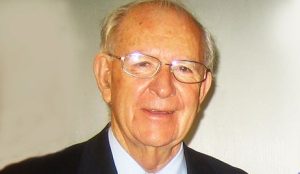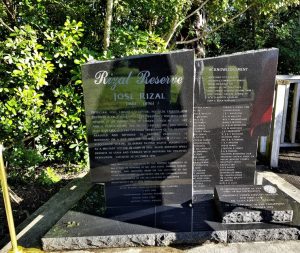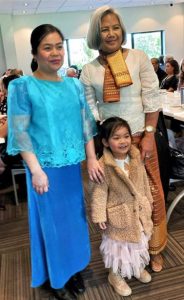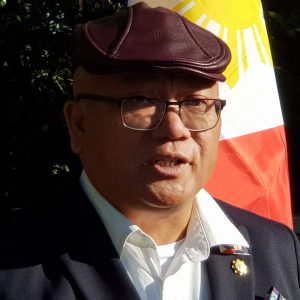(above:) Philippine Independence Day Commemoration 2023 at the Rizal Reserve in Avondale, Auckland. Photo / Migrant News
By Ricky Matthew
AUCKLAND – Jose Rizal holds the distinction of being the most renowned individual of Filipino descent and is widely regarded as the national hero of the Philippines.
Today his legacy is honored through an unparalleled number of monuments throughout the Philippine archipelago and in various locations worldwide.

In an effort to promote the significance of Jose Rizal’s contributions to Philippine Independence, the late Graeme Dabb, former Honorary Consul General of the Philippines for Auckland and the North Island region for nearly 3 decades, pushed for the creation of a memorial reserve for Jose Rizal here in New Zealand.
“Graeme was instrumental in the naming of an Auckland reserve after Dr. Jose P. Rizal, a Filipino national hero,” said Delamar Solivio Middleton, a Filipino community leader, in her message on the Facebook page of the Ilonggo Integrated Association.
Another member of the Filipino community in Auckland, Rani Sharma Dela Cruz, noted on Facebook that: “There is a Rizal Reserve in Auckland, New Zealand, close to Corregidor Place (can’t get more Filipino than that and yes, there is a street named Corregidor in Auckland). A joint effort of the Auckland Filipino community and the Council … a place to honour our national hero, Jose Rizal.”

Found in the heart of the Rizal Reserve in Avondale is a memorial dedicated to Rizal. It was put in place by the Auckland City Council, the Philippine embassy, and Hon Consul-General Graeme Dabb. It serves as a tangible monument for Filipinos to admire as they remember Rizal’s commitment on Philippine Independence Day every year.
The Filipino community and the members of the Knights of Rizal come together at the Rizal Reserve every year for a wreath laying, prayer, a commemoration of Jose Rizal and remembrance of the years of hardship before finally achieving independence in 1898. The purpose is to foster a sense of pride in the heritage and history of the Philippines.

A Filipino primary school teacher in Auckland, Ian Galavan (left), spoke about his pride in having a tangible memorial for Jose Rizal that he, and other Filipinos, can easily visit. “I am proud, indeed! It’s truly remarkable to witness the profound impact of Filipino culture and history reaching distant corners of the world. The presence of a memorial dedicated to Dr. Jose Rizal, one of the Philippines’ most revered national heroes, is a testament to the enduring legacy he left behind.
“This memorial serves as a reminder of the values Rizal embodied, such as love for country, dedication to education and the pursuit of truth. It also symbolises the cultural connections between the Philippines and New Zealand, fostering understanding and appreciation for Filipino heritage in the local community. The existence of such a memorial creates an opportunity for people to learn about Rizal’s life, teachings and the rich history of the Philippines.
“Moreover, having a Jose Rizal Memorial in New Zealand enhances cultural diversity and promotes inclusivity within society. It provides a space for Filipinos living in New Zealand to feel a sense of belonging and it encourages the exchange of cultural experiences between different communities. This memorial becomes a place of unity, where individuals from various backgrounds can come together and celebrate the enduring legacy of Dr. Jose Rizal.
Flor Skinner (extreme right) and family at the Independence Day 2023 event. photo / Migrant News

“For younger generations, their presence is vital in carrying forward our heritage and in nurturing the values instilled by our ancestors. Embrace the opportunity to learn from the past, appreciate our roots and forge a brighter future for both the Filipino community and New Zealand as a whole.”
BACKSTORY: On June 12, 1898, Filipino revolutionary forces, led by General Emilio Aguinaldo, publicly read the Act of the Declaration of Independence in Kawit, Cavite, that proclaimed the sovereignty and independence of the Philippines from the colonial rule of Spain, following Spain’s defeat at the Battle of Manila Bay during the Spanish-American War.
Dr. Jose Rizal, often referred to as the national hero of the Philippines, played a crucial role in the country’s journey towards independence. Born in 1861, Rizal was not only a talented writer and intellectual, but also a passionate advocate for the rights and welfare of his fellow Filipinos under Spanish colonial rule.

Rizal’s influential writings, such as his novels ‘Noli Me Tangere’ and ‘El Filibusterismo’, exposed the injustices and abuses committed by the Spanish authorities. Through his works Rizal awakened the consciousness of the Filipino people, instilling in them a sense of national identity and pride.
The efforts of Rizal extended beyond his literary achievements. According to the Chapter Commander of the Knights of Rizal in Auckland, Sir Roy Boquiron (left), “Rizal established the La Liga Filipina on the 2nd of July, 1892”. It was a progressive organization that aimed to promote political and social reforms peacefully. Although the organization was short-lived due to government suppression, it laid the groundwork for future revolutionary movements.










































